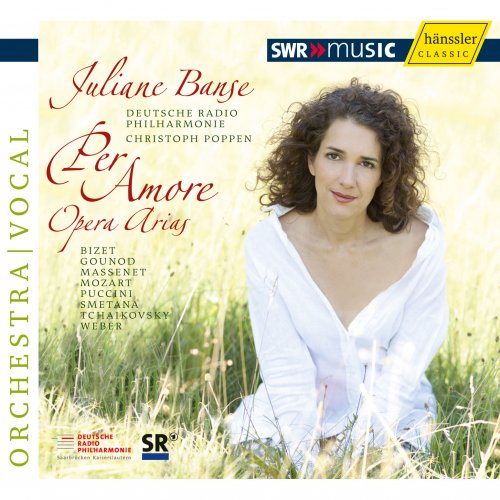
Juliane Banse - Per Amore: Airs d'opéras (2011)
BAND/ARTIST: Juliane Banse
- Title: Per Amore: Airs d'opéras
- Year Of Release: 2011
- Label: SWR Classic
- Genre: Classical
- Quality: FLAC (tracks)
- Total Time: 57:57
- Total Size: 247 Mb
- WebSite: Album Preview
Tracklist:
Così Fan Tutte, K. 588, Act I (Wolfgang Amadeus Mozart)
1. Recitative. Temerari! Sortite fuori di questo loco! - Aria. Come scoglio 05:38
Le nozze di Figaro, K. 492, Le nozze di Figaro, K. 492, Act III (Wolfgang Amadeus Mozart)
2. Recitativo and Aria. E Susanna non vien! … Dove sono i bei momenti (the Marriage of Figaro) 06:04
Der Freischütz, J. 277, Der Freischutz, J. 277, Act II (Carl Maria von Weber)
3. Wie nahte mir der Schlummer 08:04
Eugene Onegin, Op. 24, TH 5, Eugene Onegin, Op. 24, Act I (Konstantin Shilovsky)
4. Puskai pogibnu ya, no pryezhde 12:09
Prodaná nevěsta (Sung in German), Prodana nevesta [the Bartered Bride], Act III (Bedrich Smetana)
5. Endlich allein [Sung in German] [the Bartered Bride] 05:49
La bohème, Act I (Giacomo Puccini)
6. Si. Mi chiamano Mimi 04:35
Gianni Schicchi (Giacomo Puccini)
7. O mio babbino caro 02:21
Manon, Act II (Jules Massenet)
8. Allons! … Il le faut! … Adieu, notre petite table 03:29
Carmen, WD 31, Carmen, Act III (Georges Bizet)
9. Recitative. C'est des contrebandiers le refuge ordinaire 05:33
Faust, CG 4, Faust, Act II (Jules Barbier)
10. O Dieu! Que de bijoux! 04:19
Performers:
Juliane Banse (soprano)
Deutsche Radio Philharmonie
Poppen, Christoph (conductor)
Così Fan Tutte, K. 588, Act I (Wolfgang Amadeus Mozart)
1. Recitative. Temerari! Sortite fuori di questo loco! - Aria. Come scoglio 05:38
Le nozze di Figaro, K. 492, Le nozze di Figaro, K. 492, Act III (Wolfgang Amadeus Mozart)
2. Recitativo and Aria. E Susanna non vien! … Dove sono i bei momenti (the Marriage of Figaro) 06:04
Der Freischütz, J. 277, Der Freischutz, J. 277, Act II (Carl Maria von Weber)
3. Wie nahte mir der Schlummer 08:04
Eugene Onegin, Op. 24, TH 5, Eugene Onegin, Op. 24, Act I (Konstantin Shilovsky)
4. Puskai pogibnu ya, no pryezhde 12:09
Prodaná nevěsta (Sung in German), Prodana nevesta [the Bartered Bride], Act III (Bedrich Smetana)
5. Endlich allein [Sung in German] [the Bartered Bride] 05:49
La bohème, Act I (Giacomo Puccini)
6. Si. Mi chiamano Mimi 04:35
Gianni Schicchi (Giacomo Puccini)
7. O mio babbino caro 02:21
Manon, Act II (Jules Massenet)
8. Allons! … Il le faut! … Adieu, notre petite table 03:29
Carmen, WD 31, Carmen, Act III (Georges Bizet)
9. Recitative. C'est des contrebandiers le refuge ordinaire 05:33
Faust, CG 4, Faust, Act II (Jules Barbier)
10. O Dieu! Que de bijoux! 04:19
Performers:
Juliane Banse (soprano)
Deutsche Radio Philharmonie
Poppen, Christoph (conductor)
This album by soprano Juliane Banse features classics of the lyric soprano repertoire. Banse's voice is a true example of what a lyric soprano's voice should be: full, rich, open, and even at times quite powerful (especially on the high notes). And, fortunately, Banse has excellent technique that never breaks or thins, as well as diction that always clearly renders the texts. Thus, in discussing a musician of Banse's stature, one must assess the artistry in detail, given that the fundamentals are so strongly in place. Perhaps her least musically strong arias are the Mozart ones; the characters are interpreted rather on the calm side. Fiordiligi could stand to be more dramatic and her aria taken at a faster tempo (though the melisma is perfectly executed), and the Countess could have more energy, especially in her recitative, which could be more impassioned. Part of this may be the result of the orchestra being conducted at a slightly slow tempo. As Banse's native tongue is German, the arias sung in German come across as the most carefully phrased and emotionally connected. "Wie nahte" is tender, reverent, and pure. "Endlich allein," which was originally written in Czech, gives the listener a sense of darkness and fervor, that she is indeed alone and grieving. Banse undertakes Tchaikovsky's notoriously difficult "Tatiana's Letter Aria," and it is evident that the Russian language suits her voice well. However, one might say that the aria needs a more intimate, girlish quality that captures the Russian sense of melancholy that pervades so much of their music and literature, rather than Banse's more energetic, powerful interpretation. The Italian arias, "Mi chiamano Mimi" and "O Mio Babbino Caro" showcase Banse's lovely sound and also her power. But here, too, one senses the need for more connection to the phrases and the emotions of the character. The last three pieces are sung in French, which also seems to suit Banse's voice very well. One certainly hopes she will perform the entire role of Micaëla, as "Je dis que rien" truly convinces the listener she is terrified, but must seek her beloved Don José. "Ah, je ris" (or "The Jewel Song," as it is more commonly known) shows a very expressive side of the artist and her capability of singing with great passion. In sum, Banse has a gorgeous voice and gives some very good interpretations. The sound quality could use some improvement, as the album plays somewhat softly.
As a ISRA.CLOUD's PREMIUM member you will have the following benefits:
- Unlimited high speed downloads
- Download directly without waiting time
- Unlimited parallel downloads
- Support for download accelerators
- No advertising
- Resume broken downloads


